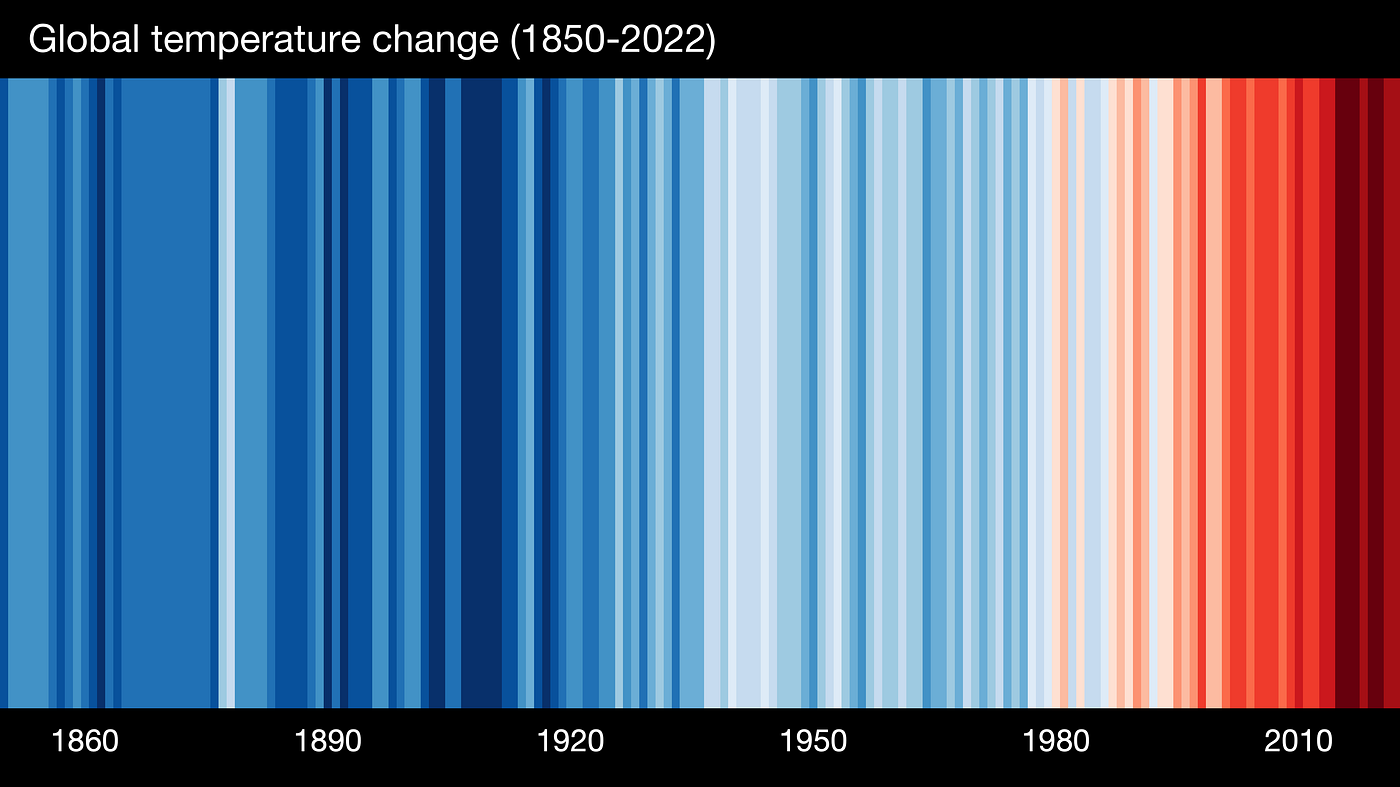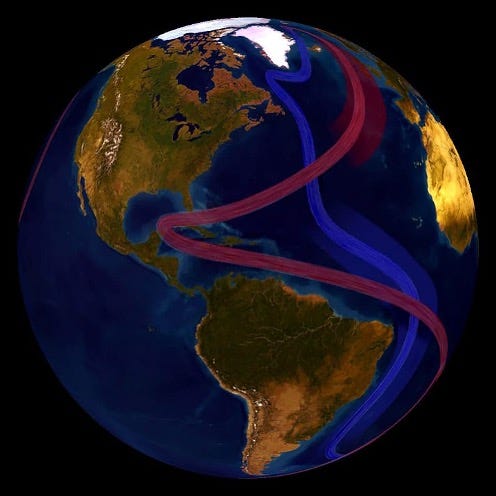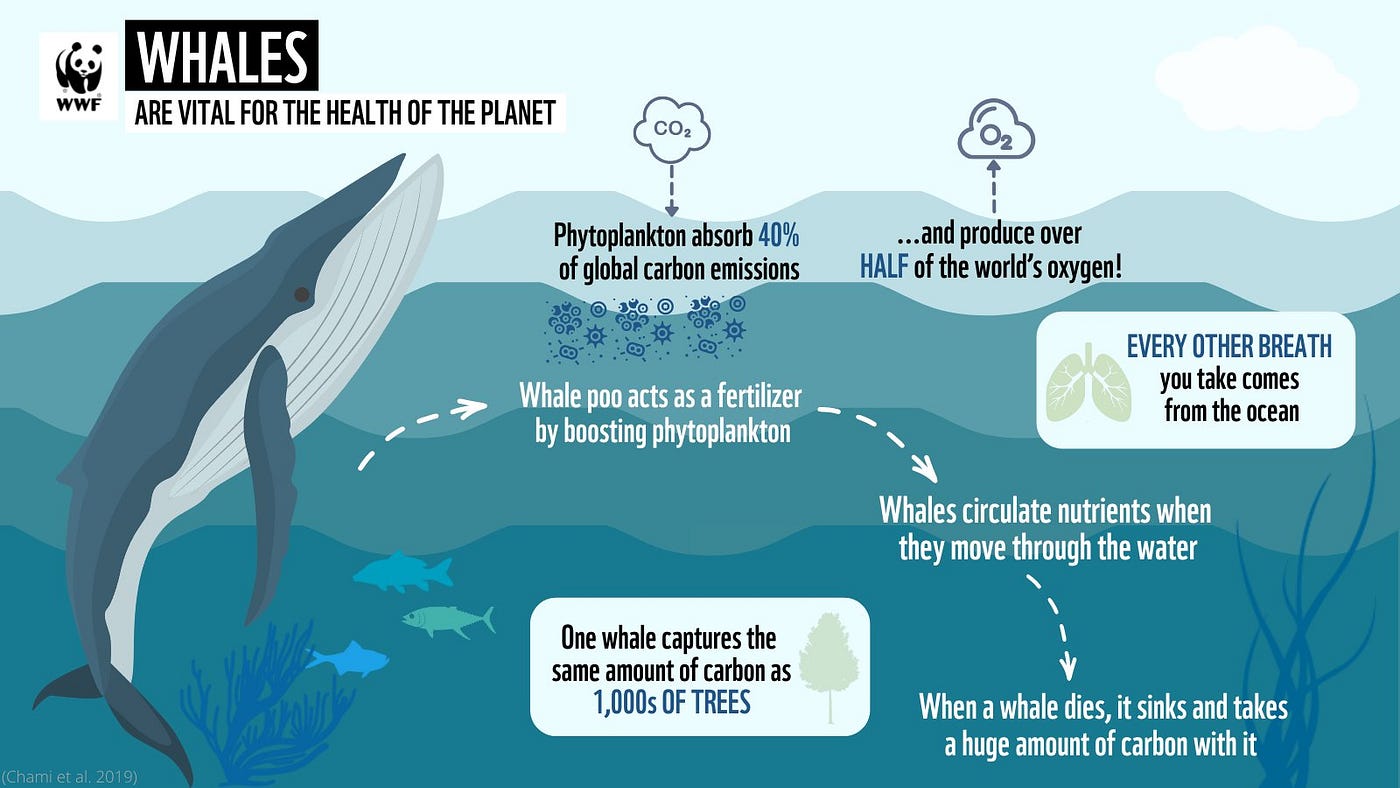How can responsible travel help build climate resilience?
Ocean is our best climate tech, and restoring marine biodiversity is key to restoring the ocean’s ability to sequester carbon in the deep.

Recent data shows that global mean temperatures over the past 12 months were the warmest on record at 1.52°C above the pre-industrial average [1], and studies have also warned that our greatest climate regulator, ocean currents called the Atlantic meridional overturning circulation (AMOC), is close to tipping point [2]. A collapse of the AMOC could reshape the global climate. Kodama Travel’s mission is to restore our ecosystems and protect wildlife through responsible travel; however, how can we reconcile travel and its inevitable carbon footprint in times of climate change? Here, we’ll discuss how responsible travel can support ocean conservation and help build marine ecosystem resilience to climate change.

First, let’s talk about ocean science
Since the industrial era, the oceans have absorbed c.40% of CO2 emitted into the atmosphere, thereby helping to neutralise climate change effects [3]. However, the ocean’s capacity to store CO2 and heat is not limitless, and changes in ocean temperature can impact ocean circulation, stratification, and biochemistry, all exacerbating climate change through feedback mechanisms [3]. Ocean circulation plays a crucial role in transporting heat through the globe and sequestering atmospheric carbon in the deep ocean [4]. Since the ocean is thought to be capable of switching between different equilibrium states, it has been hypothesised to play a key role in sharp climatic transitions such as when the Earth’s climate alternated between glacial and interglacial conditions, as well as abrupt warming and cooling episodes such as Dansgaard-Oeschger and Heinrich events [5].
One region crucial to global climate is the North Atlantic Ocean, which acts as a major carbon sink and a key mechanism for heat transport [6]. The AMOC is part of the great ocean conveyor belt which transports heat and salt from the tropics to the subpolar region and returns cooler deeper water southwards (Figure 2) [7, 8]. The AMOC connects two hemispheres and the heat it releases contributes to both the milder climate in northwest Europe and the mean position of the Intertropical Convergence Zone (ITCZ) being north of the equator [4]. However, recent climate research shows that the AMOC has been at its weakest in recent decades [9, 10]. A weakening or collapse of the AMOC could reshape global climate patterns with profound consequences for life on Earth, such as decreasing northward heat transport by up to 50% leading to a far colder Europe and shifting the ITCZ equatorward thereby reshaping the entire tropical belt [4, 6, 11–14]. Predicted changes to deep convection regions (the Labrador Sea, the Irminger Sea, and the Nordic Seas) will not only impact AMOC strength but may also alter regional ocean dynamics and nutrient availability, impacting marine ecosystems in turn [10]. Although it remains contested whether the current AMOC weakening is a normal decadal oscillation or a shift towards a new and likely weaker equilibrium [15, 16], short-term geological timescale (decadal to centennial) changes to AMOC stability can have profound environmental, social, political, and economic consequences.

We must restore ocean ecosystem resilience
To protect our oceans, we must restore their resilience to climate change. One of the biggest threats facing our oceans is extractive-based economic activities, particularly fishing. In the past century, 80% of fish biomass has been lost [18]. By the 1980s, almost 90% of the global whale population was lost to hunting until a commercial whaling ban was established in 1986; nonetheless, the ban was not globally observed and 40,000 large whales have been lost since the ban [19]. The ocean has an intricate relationship with its inhabitants: whale falls would have been a source of food for benthic organisms, and whale excreta would have brought nutrients, including iron, back to the ocean surface, stimulating primary productivity and capturing atmospheric CO2 [20, 21]. The role of vertical migration and transporting nutrients between the epipelagic and deep ocean is fulfilled by many marine animals, many of which have been threatened or hunted to extinction [20, 22]. Unprecedented anthropogenic interference, coupled with climate change, can compound the stressors facing marine life thus destabilising marine ecosystems [23–25]

For many regions, tourism is a significant income source for conservation initiatives, and acts as a viable alternative economic activity for former fishing communities. Even artisanal fishing can cause huge damage to the marine ecosystem partly due to the advancement of fishing equipment and boats, and increasing global demand. For example, the highest level of manta and devil rays by-catch globally is due to artisanal fishing, whilst demand for their gills is fuelling commercial fishing of these keystone species.
The climate is not an isolated system, but is influenced by ocean circulation, ice volume, wind, marine biodiversity and more — a complex system that scientists are still grappling with. Therefore, when we look at the impact of travel on climate change, we must consider both carbon emissions and sequestration.
Responsible travel extends beyond reducing carbon emissions
At Kodama Travel, we don’t believe carbon-offsetting is a viable way to transition to a sustainable future. In fact, it has often been used as a license to pollute, and there is mounting scientific research showing carbon-offsetting schemes are not effective, sometimes they even cause environmental damage [26]. This is why our focus is on restoring biodiversity and ecosystem resilience.
Whilst we champion travellers to adopt more sustainable travel methods, such as using trains instead of planes whenever possible, responsible travel extends beyond simply flying less. We must recognise that what we do in destination can have a significant impact. Here, we highlight a few causes we champion related to marine conservation and climate change:
- We support #emptythetank. We believe that keeping dolphins and whales in captivity, which have often been snatched away from their families in the wild, is a cruel practice that should be confined to our historical sins. Furthermore, these keystone species are fundamental to the oceans’ carbon pump and their ability to sequester carbon in the deep. Therefore, we do not feature any tours involving aquariums or animal performances.
- We aim to influence practices in-destination. For countries that still allow whale and dolphin hunting, we have supported suppliers who campaign against these practices in-country.
- We encourage travellers to be mindful during their travels. For example, eating seafood when travelling to a no-take marine protected area where fishing is banned may not be a good idea, and can inadvertently encourage illegal fishing and overfishing. As we further develop our product offering, we want to make it easier for our customers to make responsible choices in destination.
It takes collective efforts to make responsible travel more than a slogan. At Kodama Travel, we believe this practice should be the default rather than optional. World Animal Protection has produced damning reports on how leading tour operators are seriously failing wildlife, highlighting how far the industry has to go to be considered nature-positive.
Through changes over eons, we see the fragility and resilience of the pale blue dot and its inhabitants. The Earth has been through five mass extinction events, yet none were driven by an intelligent and sentient species. Collectively, human society needs to reimagine the current political-economic system to see another possibility of living with the environment and our non-human kin. Our civilisation’s very own survival depends on it.
REFERENCES
1. Science media centre. Expert reaction to data showing (a) Jan 2024 was the warmest on record globally and (b) Feb 2023 — Jan 2024 was the warmest on record at 1.52°C above the 1850–1900 pre-industrial average. 2024 [cited 2024 10th Feb]; Available from: https://www.sciencemediacentre.org/expert-reaction-to-data-showing-a-jan-2024-was-warmest-on-record-globally-and-b-feb-2023-jan-2024-was-the-warmest-on-record-at-1-52c-above-the-1850-1900-pre-industrial-average/.
2. van Westen, R.M., M. Kliphuis, and H.A. Dijkstra, Physics-based early warning signal shows that AMOC is on tipping course. Science Advances, 2024. 10(6): p. eadk1189.
3. Reid, P.C., et al., Chapter 1 Impacts of the Oceans on Climate Change, in Advances in Marine Biology. 2009, Academic Press. p. 1–150.
4. Buckley, M.W. and J. Marshall, Observations, inferences, and mechanisms of the Atlantic Meridional Overturning Circulation: A review. Reviews of Geophysics, 2015. 54: p. 5–63.
5. Thornalley, D.J.R., H. Elderfield, and I.N. McCave, Intermediate and deep water paleoceanography of the northern North Atlantic over the past 21,000 years. Paleoceanography, 2010. 25(1).
6. Whitt, D.B. and M.F. Jansen, Slower nutrient stream suppresses Subarctic Atlantic Ocean biological productivity in global warming. Proceedings of the National Academy of Sciences, 2020. 117(27): p. 15504–15510.
7. Weijer, W., et al., Stability of the Atlantic Meridional Overturning Circulation: A Review and Synthesis. Journal of Geophysical Research: Oceans, 2019. 124(8): p. 5336–5375.
8. Zarkogiannis, S.D., Disruption of the Atlantic Meridional Circulation during Deglacial Climates Inferred from Planktonic Foraminiferal Shell Weights. Journal of Marine Science and Engineering, 2021. 9(5): p. 519.
9. Caesar, L., et al., Current Atlantic Meridional Overturning Circulation weakest in last millennium. Nature Geoscience, 2021. 14(3): p. 118–120.
10. Lique, C. and M.D. Thomas, Latitudinal shift of the Atlantic Meridional Overturning Circulation source regions under a warming climate. Nature Climate Change, 2018. 8(11): p. 1013–1020.
11. IPCC, SYNTHESIS REPORT OF THE IPCC SIXTH ASSESSMENT REPORT (AR6). 2023, The Intergovernmental Panel on Climate Change.
12. Spooner, P.T., et al., Exceptional 20th Century Ocean Circulation in the Northeast Atlantic. Geophysical Research Letters, 2020. 47(10): p. e2020GL087577.
13. Schmittner, A., Decline of the marine ecosystem caused by a reduction in the Atlantic overturning circulation. Nature, 2005. 434(7033): p. 628–33.
14. Crocket, K.C., et al., Persistent Nordic deep-water overflow to the glacial North Atlantic. Geology, 2011. 39(6): p. 515–518.
15. Beal, L.M., et al., On the role of the Agulhas system in ocean circulation and climate. Nature, 2011. 472(7344): p. 429–436.
16. Boers, N., Observation-based early-warning signals for a collapse of the Atlantic Meridional Overturning Circulation. Nature Climate Change, 2021. 11: pp. 680–688.
17. NOAA. What is the Atlantic Meridional Overturning Circulation (AMOC)? 2023 [cited 2023 11th August]; Available from: https://oceanservice.noaa.gov/facts/amoc.html.
18. Lempinen, E.W. Researcher Reports Stunning Losses in Ocean Fish Biomass. 2011 [cited 2023 8th August]; Available from: https://www.aaas.org/news/researcher-reports-stunning-losses-ocean-fish-biomass#:~:text=In%20the%20past%20100%20years,symposium%20at%20the%20Annual%20Meeting.
19. International Whaling Commission. Commercial Whaling. 2019 [cited 2023 8th August]; Available from: https://iwc.int/management-and-conservation/whaling/commercial.
20. Pearson, H.C., et al., Whales in the carbon cycle: can recovery remove carbon dioxide? Trends Ecol Evol, 2023. 38(3): p. 238–249.
21. Czerski, H., Blue Machine: How the Ocean Shapes Our World. 2023, London: Penguin Random House.
22. IUCN. Human activity devastating marine species from mammals to corals — IUCN Red List. 2022 [cited 2023 27th August]; Available from: https://www.iucn.org/press-release/202212/human-activity-devastating-marine-species-mammals-corals-iucn-red-list.
23. Bijma, J., et al., Climate change and the oceans — What does the future hold? Marine Pollution Bulletin, 2013. 74(2): p. 495–505.
24. Kazanidis, G., et al., Assessing the environmental status of selected North Atlantic deep-sea ecosystems. Ecological Indicators, 2020. 119: p. 106624.
25. Doney, S.C., et al., Climate Change Impacts on Marine Ecosystems. Annual Review of Marine Science, 2012. 4(1): p. 11–37.
26. Goldberg, J., et al. Revealed: Why the UN is not climate neutral. 2023 [cited 2023 10th Feb]; Available from: https://news.mongabay.com/2023/09/revealed-why-the-un-is-not-climate-neutral/.
